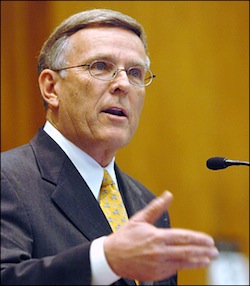Sen. Dorgan: New START is an Important First Step
April 26, 2010
Featured Image
Today's top nuclear policy stories, with excerpts in bullet form.
Stories we're following today, Monday, April 26, 2010:
Senator Byron Dorgan (D-ND) Floor Statement on the New START Treaty - C-SPAN [link]
- In my judgment, this treaty is very important. It is a very important first step--only a first step--because much more needs to be done. But it is important in terms of enhancing our security and world security. This will bolster, in my judgment, the Nonproliferation Treaty.
- It demonstrates that the United States and Russia are living up to their part of the deal under the NPT to begin reducing arms.
- As chairman of the Appropriations Energy and Water Development Subcommittee, I can tell my colleagues that the proposed budget for nuclear weapons, which is in my subcommittee, for fiscal year 2011 from this administration is more than enough to maintain the safety and reliability of our nuclear weapons;
- Sufficient so that any Chairman of the Joint Chiefs can say with confidence and authority whose requirement it is to certify each year, that we have a nuclear arsenal that can be maintained as reliable and safe for the long-term future.
Iranian Technocrats, Disillusioned with Government, Offer Wealth of Intelligence to U.S. - The Washington Post [link]
- Iran's political turmoil has prompted a growing number of the country's officials to defect or leak information to the West, creating a new flow of intelligence about its secretive nuclear program, U.S. officials said.
- Director of National Intelligence Dennis C. Blair said in a brief interview last week that the delay in the completion of the NIE "has to do with the information coming in and the pace of developments."
- One official who has seen a draft said that the study asserts that Iran is making steady progress toward nuclear weapons capability but that it stops short of concluding that the Islamic republic's top leaders have decided to build and test a nuclear device.
Striking a Prudent Balance: Obama's Nuclear Posture Review - Barry Blechman in the Bulletin of the Atomic Scientists [link]
- In considering the NPR, the administration had to walk a narrow path. On one hand, it was committed to both reducing the number of nuclear weapons in the U.S. arsenal and to reducing their role in U.S. security policies. But on the other hand, acknowledging that the elimination of nuclear weapons will take time, it recognized that steps must be taken to maintain the viability of the U.S. deterrent.
- There were, of course, also political considerations: An NPR that ignored the real-world security conditions and suggested that Washington was moving unilaterally toward a radically reduced nuclear posture would have doomed ratification of both New START and the Comprehensive Test Ban Treaty.
- Striking the right balance was tricky--the NPR's release was delayed several months--but in the end, the administration managed to find it.
Extreme Conservatives Versus the Military and National Security Leaders on Nuclear Policies - National Security Network [link]
- The Administration advanced three significant initiatives this month - the new Strategic Arms Reduction Treaty (START) with Russia, the new U.S. Nuclear Posture Review (NPR), and the recent Nuclear Security Summit (NSS) - in order to address the threats [of nuclear terrorism and nuclear proliferation].
- Not surprisingly however, extreme conservatives continue to ignore the advice and support of America's military and national security leaders, choosing instead to mischaracterize this comprehensive approach for short term political gain at the expense of our country's long term security.
- STRATCOM Commander General Kevin Chilton reiterated the military's support, saying "Today, our deterrent is safe, secure, and effective; our forces are trained and ready; and the Command is faithfully and fully carrying out its mission each and every day. I am confident that the NPR and New START outline an approach that continues to enable the men and women of U.S. Strategic Command to deliver global security for America today and in the future."
Spin Versus Facts on Nuclear "Modernization" and New START - Daily Kos [link]
- Now that all the meetings are over, the fancy pens put away, and everyone is back in Washington, DC, press coverage has died down, but the Senate consideration of the New START treaty is starting to gain steam. Lugar has said that he hopes they can "work quickly to achieve ratification of the new treaty."
- Senator Jon Kyl (R-AZ) said he believed the restrictions on replacement parts and what he viewed as inadequate funding for refurbishing weapons were signs that the administration wouldn't produce a modernization plan for the U.S.'s nuclear arsenal that he could accept.
- What Kyl means by "modernization" is somewhat vague, and a bit confused, since the US has a modernization program in place already.
- But regardless of definitions, and Kyl's complaints, "modernization" is not connected to the New START ratification process.



